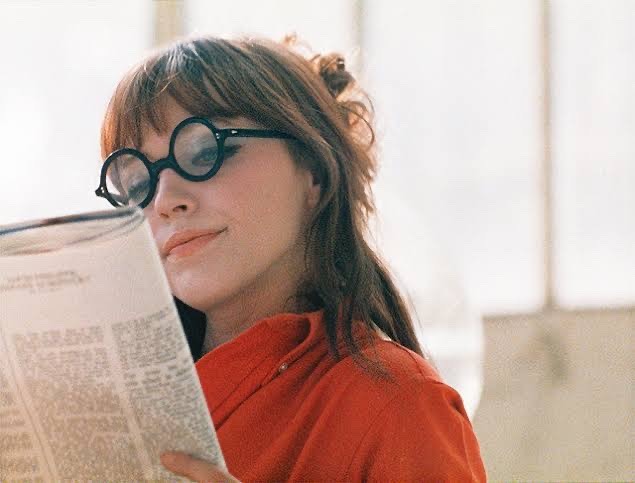
Serge (Jean-Claude Brialy) and Anna (Anna Karina) work at the same Parisian advertising firm; she as a colorist and he as a photographer. One day a photograph of a woman crosses Serge’s path and he becomes infatuated with her. His dreams and fantasies of this mystery woman consume him so much so that he will stop at nothing to find her. However, little does Serge know, that woman in the photograph is Anna. After becoming a slave to his obsession, Serge finally, through happenstance, discovers that the mystery girl and Anna are one and the same though at this point it is too late.
Anna (1967) is a made for television musical written and scored by Serge Gainsbourg. Gainsbourg and director Pierre Koralnik crafted Anna as a film about heterosexual male infatuation that uses Karina as its centerpiece. And this isn’t Anna Karina the human being, but Anna Karina the icon of the French New Wave. Karina’s character Anna is a distillation of everything she came to represent in her films with Jean-Luc Godard. She was Godard’s wife, lover, and muse and now, with Anna, Karina is the lover and muse of all of France.
Serge, like so many of Gainsbourg’s male protagonists, is an opportunistic narcissist and sleaze ball. He is both the audience surrogate and a stand in for Gainsbourg himself (who also appears briefly in the film). The audience therefore only ever sees Karina through Serge’s eyes, even though there are a number of scenes the focus solely on her. When Anna is with Serge or without him Karina exists as a kind of cultural fetish object that the camera aches to possess.
Karina epitomizes all of the “cool” and “sophistication” of the New Wave. But she also possesses a unique exuberance where every frame of film that she occupies just seems to come to life. She is an infectious spirit whose innate charisma is literally captivating. The film Anna is, in some ways, a love letter to Karina the performer and symbol while in other ways it simply strips the image of Karina of her humanity. This paradoxical methodology is the subject of Karina’s signature song in the film “Roller Girl”.
The correlation between celebrity as object and celebrity as person is one of the hallmarks of Gainsbourg’s cinematic oeuvre. Anna is an early film for Gainsbourg who opted to let Koralnik direct instead of himself. The two would collaborate again on the film Cannabis (1970) before Gainsbourg would direct all of his own scripts. In Koralnik’s hands Anna complete’s a kind of stylistic circuit that began with Godard’s Une femme est une femme (1961) then continued through Richard Lester’s Help! (1965) before filtering back into the yé-yé idiom of Anna.
As a movie musical, Anna combines traditional MGM style outbursts into song with music video tableaus. The film is at its best when numbers take on a dreamy quality that is essentially a synthesis of these two strategies. The sequence for Karina’s song “Sous Le Soleil Exactement” is the best example of this synthesis while the numbers “Pistolet Joe” and “G.I. Joe” represent the most complete cinematic fantasias. These sequences are largely effective but the more traditional numbers, particularly “J’Étais Fait Pour Les Sympathies”, feel stagnant or cliche.
Anna as a film only succeeds when Anna Karina is on screen. Every time the film turns its focus back to Serge’s search it loses momentum as well as the verve of its quasi-reflexive practices. Koralnik’s camera makes for a better Serge as it lingers over Karina’s face and studies her every gesture with the eye of a smitten lover. Serge merely disrupts the image complex, pitting himself between the image of Karina and the gaze of the spectator.
